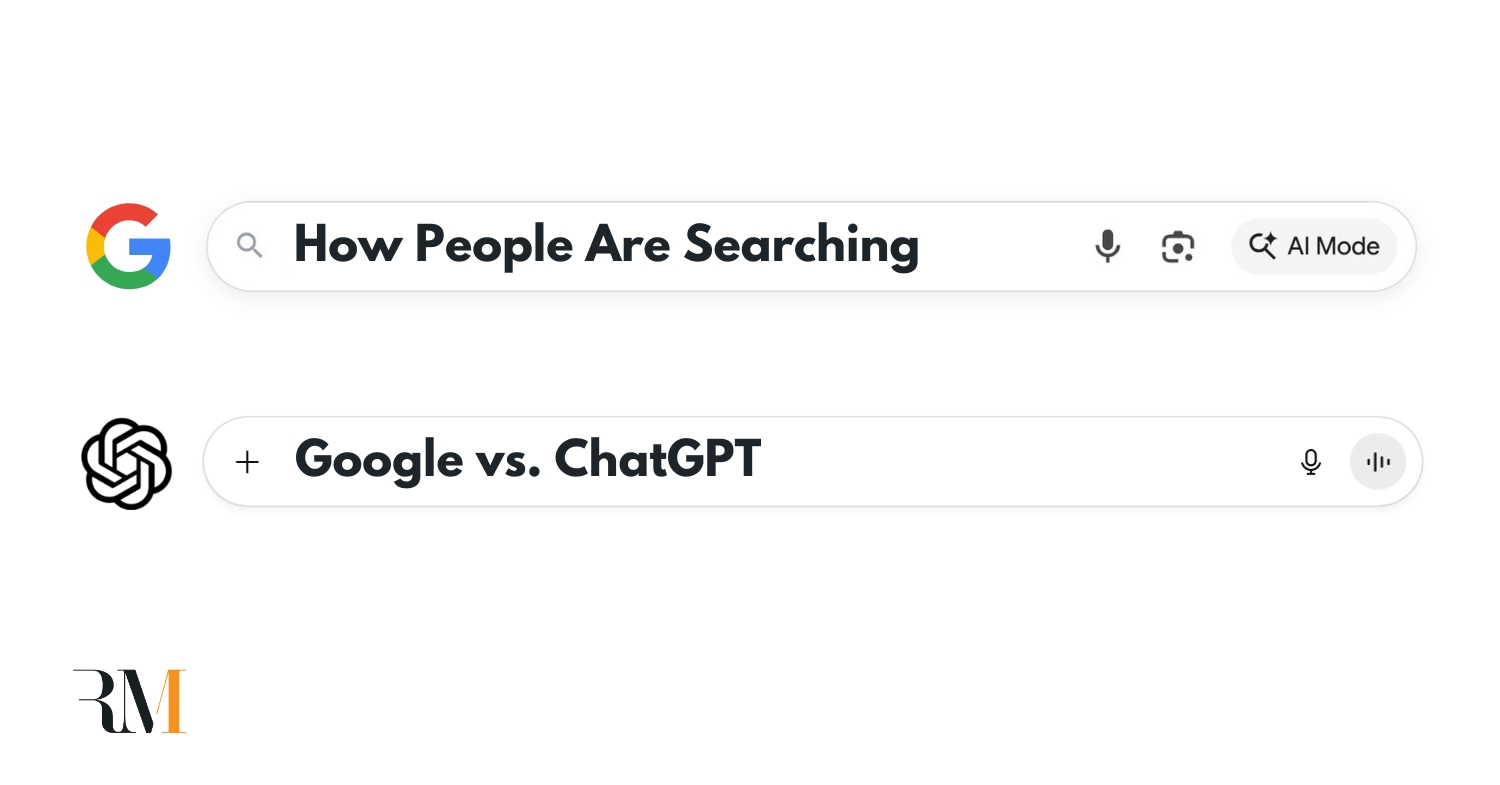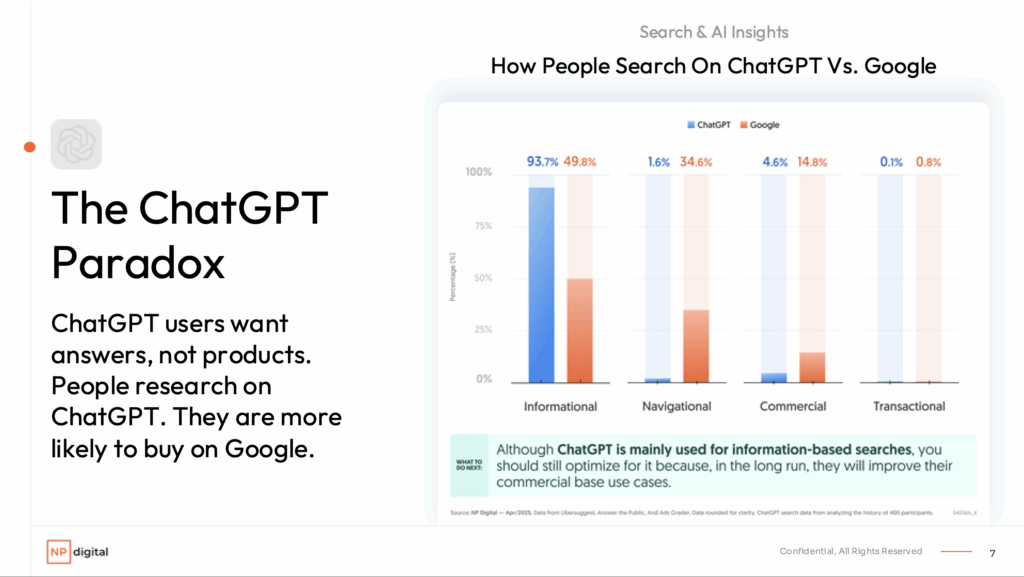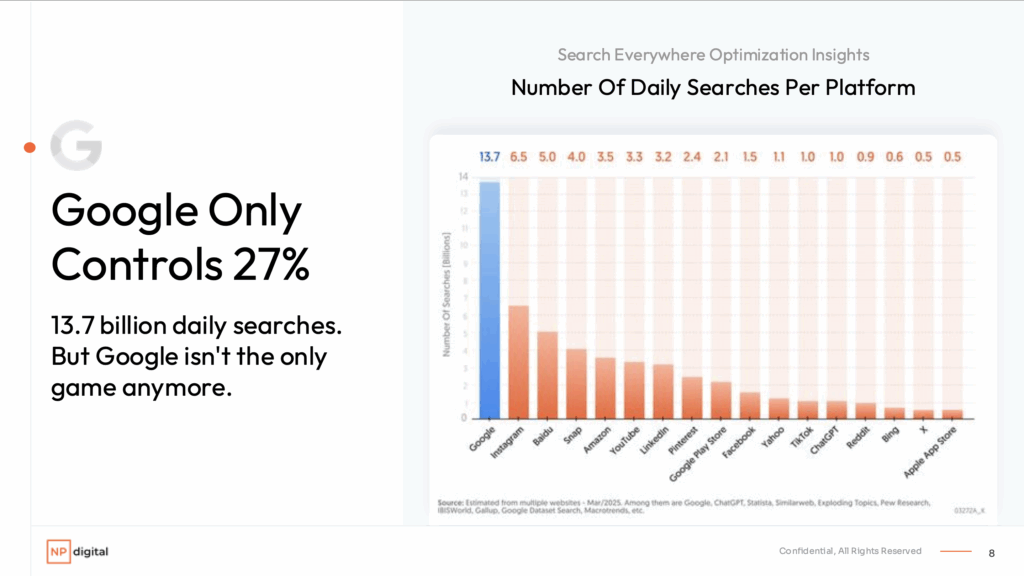How People Are Searching: Google vs. ChatGPT Market Share in 2025

AI tools like ChatGPT are changing how people search, but Google still dominates where it counts. ChatGPT excels at answering questions, while Google drives conversions. Understanding this shift can help practices balance SEO and AI visibility.
Search behavior is changing fast. With AI tools like ChatGPT, Perplexity, and Gemini transforming how people find information, it’s natural for businesses, especially medical and dental practices, to wonder whether Google’s dominance is fading. While AI is creating exciting new opportunities for search visibility, the data tells a clear story: Google still drives the majority of commercial traffic, while ChatGPT leads in information gathering. Understanding how patients use each platform is key to developing a strategy that earns attention and trust in both spaces.
The ChatGPT Paradox
ChatGPT has revolutionized how people ask questions, but its audience has different intent compared to Google users. According to recent NP Digital data, 93.7% of ChatGPT searches are informational, while only 0.1% are transactional. In contrast, Google balances research with buying behavior; about half of its users are looking for information, while a meaningful portion are actively shopping or booking services.
That’s what marketers are calling the ChatGPT Paradox: people go to ChatGPT for answers, not products. They research there but buy on Google.
For medical and dental practices, this distinction is powerful. ChatGPT is an excellent channel for educating patients — answering questions about procedures, recovery, or candidacy — while Google remains the stronger driver of appointment conversions. Optimizing for both means combining authority-building educational content with search-friendly service pages designed for action.

Search Market Share in 2025: Google’s Grip Is Loosening But Still Strong
It might be surprising to learn that Google now accounts for just 27% of global daily searches (around 13.7 billion per day).1 That’s still enormous, but it shows how fragmented search has become. People are finding answers across an expanding landscape of platforms: YouTube, TikTok, Reddit, Amazon, and of course, ChatGPT.
For marketers, this diversification means “search” no longer belongs to a single platform. Users might research a cosmetic procedure on ChatGPT, verify it through a YouTube video, and finally schedule after reading Google reviews.
Despite this shift, Google remains the primary engine for commercial intent. Users trust it for local results, verified listings, and real-time availability, which are crucial factors when choosing a doctor. AI platforms, on the other hand, serve as research companions, giving thoughtful summaries but still referring users back to authoritative websites.

The Long-Tail Truth: Specificity Sells
As AI influences how people search, one trend is becoming clear: the more specific the query, the higher the conversion rate. Data shows that single-word searches convert at just 0.17%, while 7-word (or longer) searches convert at nearly 1.8%1.
ChatGPT and other AI platforms naturally encourage long-form, conversational questions, which is exactly the kind that align with patient intent. Someone might type “breast augmentation” into Google, but they’ll ask ChatGPT, “What’s recovery like after a breast augmentation with silicone implants?”
Practices that publish content answering these long-tail, question-based queries position themselves for success across both AI and traditional search. This strategy not only supports Google SEO but also boosts AI discoverability, since platforms like ChatGPT rely heavily on authoritative, detailed web content when forming responses.
The AI Platform Showdown
Among all AI-powered search tools, ChatGPT remains the clear leader, driving 87% of AI-related traffic and 82% of AI-influenced sales, according to NP Digital. Competing platforms like Copilot, Gemini, Perplexity, and Claude account for only small percentages by comparison.
This dominance means ChatGPT is currently the primary AI channel worth optimizing for. The key, however, is understanding how it works: ChatGPT doesn’t crawl the web like Google. It references high-quality, credible content already ranking well online or cited by authoritative sources.
That means traditional SEO is still incredibly important. The more trustworthy, consistent, and well-structured your content is, the more likely it is to be referenced by AI platforms in their responses. Think of answer engine optimization (AEO) not as replacing SEO, but extending it into a new layer of visibility.
Beware of “AI SEO” Scams
As interest in AI search optimization grows, so do the marketing claims around it. Before committing to any new strategy, practices should understand what’s truly possible and where caution is needed.
In recent months, some companies have begun offering so-called “AI SEO” services that promise guaranteed placement in ChatGPT results or claim to have insider methods for ranking within AI-generated answers. These offers may sound impressive, but they misrepresent how AI systems actually work.
It’s essential to understand that no one can guarantee placement in ChatGPT results. ChatGPT doesn’t offer paid ranking or prioritize specific companies; it relies on natural language processing and publicly available data from trusted sources.
Healthcare practices should be wary of vendors selling “AI visibility packages” or claiming proprietary access to AI algorithms. The most effective approach remains the same as ever:
- Publish authoritative, accurate, and original content.
- Maintain strong SEO foundations across your website.
- Build reputation signals through consistent branding, reviews, and backlinks.
These are the factors AI platforms and Google use to determine which content to trust.
The Takeaway: Google’s Still King, But ChatGPT Is Rising Fast
AI hasn’t dethroned Google; it’s simply reshaping the way people search. Users now move fluidly between platforms: researching on ChatGPT and booking through Google.
For medical and dental practices, the best strategy is balance: continue investing in proven SEO strategies while preparing for AI-driven discovery. That means creating content that not only ranks well but also answers the deeper, conversational questions real patients are asking.
Search is evolving, but credibility, clarity, and trust still rule the results. To learn how our team at Rosemont Media can help your practice stay visible in both traditional and AI-driven search, contact us today. We’ll create a customized strategy designed to strengthen your online presence, attract qualified patients, and keep you ahead of the changing search landscape.
¹Source: NP Digital 2025 Summit, September 2025.